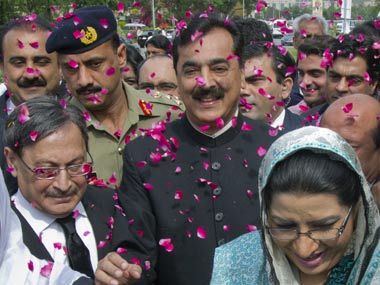In an earlier time in Pakistan, coups came dressed in army fatigues. Nowadays, they come cloaked in judicial robes. Anyway you look at it, the dramatic developments in Islamabad in which Prime Minister Yousef Raza Gilani was unseated from office count is a ‘coup’. It marks one milestone in the ongoing power tussle between the three institutions of the state - the civilian government, the Pakistan army-ISI and the judiciary. [caption id=“attachment_349690” align=“alignleft” width=“380” caption=“Reuters”]  [/caption] And although today’s development doesn’t bring down the civilian government in the way that a regulation coup would have done, it nevertheless introduces an element of uncertainty that could be exploited by the Pakistani army and the ISI to expand their space of operations. Even if the PPP elects another leader tonight, the government will likely prove unstable, advancing elections that are due in 2013. In the event of fresh elections, the PPP will be looking to wear the label of martyrdom in the hope of extracting political mileage. But given the extent of popular disenchantment with ’establishment politicians’, that will be a hard story to sell. In that event, the cricketer-turned-politician Imran Khan, who has the tacit support of the Army and who enjoys enormous support among the youth of Pakistan, is perceived to have an edge. For the Indian administration watching the events as they unfold, they offer a lesson in the risks of striking deals with civilian governments on the strength of the warmth of “personal equations” with the leaders there. For everytime a new leader takes over, the reset buttoon of bilateral relations gets pressed. The Manmohan Singh government had been warming up to the Gilani government, and to President Asif Ali Zardari, which was vigorously pushing back against the army and the judiciary to carve out a space for itself. India and Pakistan recently concluded a round of talks on Siachen, and the entire Pakistani establishment, including the Army, had been exerting undue pressure on India to agree to demilitarise the glacier, which effectively would have meant India giving up its commanding heights. Many liberal commentators in India had made much of the fact that the time was ripe for a deal on Siachen, given that bilateral relations were at their best since the November 2008 Mumbai terror attacks. Talks on the resolution of the Sir Creek dispute are currently on. But the risk of striking deals with a civilian government based on a momentary improvement in relations is that - as today’s developments reveal - there is no certainty of whether they will be honoured in the event of a creeeping ‘coup’. Far better for India to wait for the various arms of the Pakistani establishment to sort it out. The wisdom of that prudent strategy has been borne out by today’s events.
The risk of India striking deals with a civilian government based on a momentary improvement in relations is that - as today’s developments reveal - there is no certainty of whether they will be honoured in the event of a creeeping ‘coup’.
Advertisement
End of Article
Written by Vembu
Venky Vembu attained his first Fifteen Minutes of Fame in 1984, on the threshold of his career, when paparazzi pictures of him with Maneka Gandhi were splashed in the world media under the mischievous tag ‘International Affairs’. But that’s a story he’s saving up for his memoirs… Over 25 years, Venky worked in The Indian Express, Frontline newsmagazine, Outlook Money and DNA, before joining FirstPost ahead of its launch. Additionally, he has been published, at various times, in, among other publications, The Times of India, Hindustan Times, Outlook, and Outlook Traveller. see more


)
)
)
)
)
)
)
)
)



